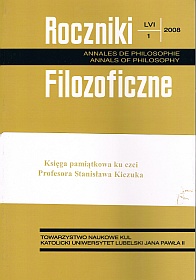Karol Wojtyła’s Philosophy of the Human Person as the Grounds to Defend Human Rights
Abstract
The teaching of John Paul II clearly articulates the strain of human rights. The Pope initiates a dialogue with the Enlightenment tradition and develops the theological and philosophical foundations of the culture of human rights. Karola Wojtyła’s personalistic thought appears to be a
very coherent and reliable key to understand the doctrine of human rights. Wojtyła stresses subjectivity and non-reducibility of the person as a concrete human „I.” It is both autonomy and transcendence that constitute dignity of the person towards other personal and impersonal beings.
References
Friedman M.: Goods in Conflict?, [w:] G. Weigel (ed.), A New Wordely Order. John Paul II and Human Freedom, Washington, D.C.: Ethics and Public Policy Center 1992.
Jan Paweł II, Tryptyk rzymski, Kraków: Wydawnictwo św. Stanisława BM 2003.
Jan Paweł II, Pamięć i tożsamość, Kraków: Wydawnictwo Znak 2005.
Reale G.: Karol Wojtyła un pellegrino dell’Assoluto, Milano: Bompiani 2005.
Rosmini A.: The Philosophy of right, transl. by D. Claery, T. Watson, vol. II, Durham: Rosmini House 1993.
Św. Augustyn: Wyznania, tł. Z. Kubiak, Warszawa: Instytut Wydawniczy PAX 1978.
Wierzbicki A. M.: Antropologia Karola Wojtyły odczytana w jego poezji, „Ethos” 76 (2006), nr 4, s. 103-113.
Wojtyła K. / Jan Paweł II, Poezje, dramaty, szkice. Tryptyk rzymski, Kraków: Wydawnictwo Znak 2004.
Wojtyła K.: Osoba: podmiot i wspólnota, [w:] tenże, Osoba i czyn oraz inne studia antropologiczne, Lublin: TN KUL 1994, s. 385.
Wojtyła K.: Podmiotowość i „to, co nieredukowalne” w człowieku, [w:] tenże, Osoba i czyn oraz inne studia antropologiczne, Lublin: TN KUL 1994, s. 440-441. Po raz pierwszy artykuł ukazał się w języku angielskim: Subjectivity and the Irreducible in Man, „Analecta Husserliana” 7 (1978), s. 107-114.
Copyright (c) 2008 Roczniki Filozoficzne

This work is licensed under a Creative Commons Attribution-NonCommercial-NoDerivatives 4.0 International License.





